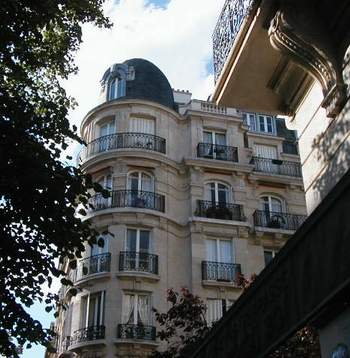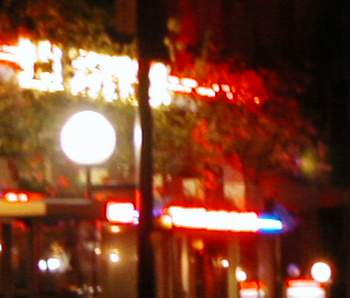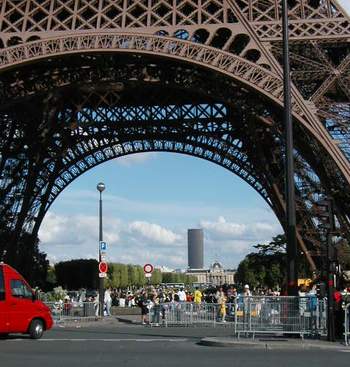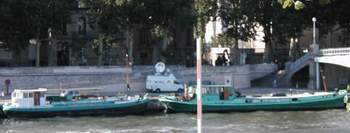

A pieced-together panorama of the neighborhood, taken from steps of the church at the base of the rue du Commerce.
Paris Journal 2003Wednesday, July 30 |
Sign My
Guestbook View My Guestbook |
 Sign on the avenue de Montaigne. |
The
newspapers report that the rise of the euro against the dollar is responsible for pushing
Paris up from the 17th most expensive city in the world to the 7th most expensive,
according to a study by the Economist Intelligence Unit. The last time we heard of
this report, about two years ago, Paris was on about the same level as Miami, FL, or
Washington, DC. London was far more expensive then. Now, the latest report
indicates that London, in 10th place, is cheaper than Paris! We're astounded. Tokyo and Osaka remain the most expensive places. I think the barometer the EIU uses is highly focused on per-square-foot real estate cost, which is why places like Tokyo are way up at the top. Living in the U.S.A is now a bargain. New York is now only the 13th most expensive city. Fortunately, we aren't planning to buy an apartment in Paris. Other interesting numbers: the newspaper Liberation reports that there has been an 80 percent drop in the number of American tourists visiting France in the first half of 2003 (compared to the first half of 2002). The paper contradicts the French Tourism Ministry, which assesses the decrease at 30 percent (for the first 5 months of 2003). The Tourism Ministry attributes the drop solely to the decrease in the dollar. But CÚsar Balderacchi, president of a group representing French travel agents, said "Our colleagues across the Atlantic no longer schedule France," according to Liberation. Not mentioned is the overall decrease in the American appetite for travel. |
Gobbledygook on the "Informations" electronic billboard near the Paris city hall. |
Astrid Betancourt was interviewed by Le Figaro about the aborted attempt to get her sister, Ingrid, out of the hands of the leftist guerrillas who kidnapped her over a year ago in Colombia (see July 8 and July 24). She said that her family was contacted by a messenger who said that he was sent by FARC (the guerrillas). He told the family that FARC had decided to liberate Ingrid because she has an important political message for the Colombian government. Astrid was told that a person from the family and a priest should be in Leticia, a village on the Colombian/Brazilian border on July 5. Everything had to be done discretely to avoid a carnage like the one that happened two months ago in an attempt to liberate a different hostage. The parish priest of Leticia, Father Gonzalo, was designated to accompany Astrid. Once there, FARC contacted Astrid and the priest and told them to go to a village at 8AM in a boat on the Amazon and to wait until July 9, the date planned for Ingrid's liberation. At 9AM, she and Father Ganzalo left for the meeting point. |
 Haussmannian building on avenue de Suffren. |
Astrid
asked for help from the French government when she was told that Ingrid is sick. The
long voyage required to get Ingrid to the meeting point, and the importance of the message
she carries, pressured Astrid to contact the French embassy in Bogota on July 6. (We
must not forget that Ingrid is both a French and Colombian citizen; Astrid probably
is, too, because they both spent a good part of their childhoods in France when their
father was a diplomat there.) Astrid asked France for a medical team and a plane so that Ingrid could easily be transported. Then the French foreign affairs minister, Dominique Villepin contacted Astrid. (Dominique was one of Astrid's teachers when she attended SciencesPo, the elite Political Science Institute in Paris, in the 1980s.) Astrid explained to him why she thought the liberation of Ingrid was credible and she spoke of the possibility of bringing Ingrid back to Bogota by plane. Dominique told her that he would be up to the task. When asked if this didn't mean, then, that this was a personal initiative of Villepin, Astrid took a bit of offense and replied that she found it scandalous that people would mix this affair with French internal political quarrels. She believes the foreign affairs minister has the power to make humanitarian decisions and can endorse them right away, especially in an urgent situation such as this. |
 A maladroit use of English on a shop awning along the avenue de Suffren. |
Astrid
claims that the Brazilian authorities WERE informed by Villepin about the mission.
This is contrary to what has been reported before yesterday, I believe. Astrid did,
however, ask that the Colombian authorities not be informed because that would hinder her
sister's liberation. Hmmmmm. What is Astrid telling us about the Colombian
authorities? Astrid is adamant that this was never a military operation. Her family has always been opposed to that type of approach to her sister's liberation because it endangers the lives of the hostages. |
 Flowers on the Champ de Mars. |
She
goes even farther. She says that to pretend that the minister of foreign affairs
could organize a military rescue for Ingrid is absurd. She added: If her
family has always opposed a military intervention by Colombian authorities (as it has),
why would it ask France to do such a thing? When asked about the Brazilian press report that the number 2 leader of FARC, Raul Reyes, was to be taken aboard the French plane for medical care (he has prostate cancer), Astrid said she'd never heard of that. She says she'd never seen the plane because it waited in a little village an hour and a half from the boat where she was, at the meeting point. She was told that two women were to be liberated. It must have been Clara Rojas (a friend and colleague of Ingrid's) and Ingrid, said Astrid. She said it was never a question that France would receive a member of FARC who had become sick. |
 Le Tipaza at night, avenue Emile Zola. |
The
four people who were to be taken onto the plane were her sister, Clara Rojas, Father
Gonzalo, and herself. From July 9 to 14, Astrid stayed at the meeting
point. When she returned, she learned that a Brazilian journalist had written about
this possibility of liberation. That put an end to the operation, she said, because
FARC would henceforth be seen by surveillance set up on the road from the meeting point to
the plane. Before Monday evening, a Colombian guerrilla had confirmed, during a television news broadcast, that he had been there with every intention of liberating Ingrid. Now what troubles Astrid is that the border between Colombia and Brazil can no longer be a place of exchange because it is being watched too closely. What she wants to know most of all is who had an interest in hurting France in this affair. And who would want to screw up all means for negotiations between the Betancourt family and FARC? She asks herself, who has the interest in doing that? For what reason, indeed?
|
 |
Last
night, we had dinner again with our new friend, Alan. We went to Annapurti, 69 rue Lourmel, for Indian food. Tom had shrimp
biryani, I had lamb korma, and I can't remember what Alan had. We shared meat
samosas and vegetable pakoras for an appetizer. Tom's and my main dishes were
excellent, and Alan seemed pleased with his, too. Two complaints: the chairs
are not comfortable, and the menu used the English word, "mutton," in place of
"agneau" (French for "lamb"). Although the subheading clearly
said "Agneau," this is a big mistake because in English, mutton means sheep, a
far inferior meat, not lamb. It was lamb, all right. It was tender, juicy, and falling apart. But where was everyone? A couple people came in to pick up take out orders, but we were the only people dining there. The place was clean, and the service was friendly. The food was very good, and well-priced. I just don't understand it. The food did not come out quickly, but it never should in an Indian restaurant. If it comes out quickly, that means you're getting something that isn't freshly prepared. Who knows? Maybe we've discovered a secret place in Paris.
|
 |
At left, the crowd under the Eiffel Tower and on the Champ de Mars after the Tour de France, and the NBC news truck with satellite dish near the cat-owned boats, the Salamandre and the Julia, by the Passerelle Debilly. |
| <Previous Next> |